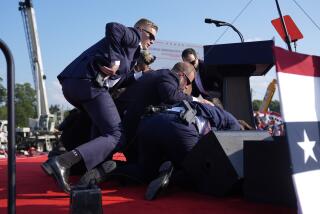Reagan Case Was the Only Power Shift
WASHINGTON — When President Reagan was shot in an assassination attempt in 1981, he underwent surgery that lasted more than three hours. When President Clinton was injured in a fall at golfer Greg Norman’s house in Florida in 1997, he underwent two hours of surgery to repair a tendon.
In neither case, however, did the White House invoke the 25th Amendment to the Constitution, as President Bush intends to do while undergoing a colonoscopy today. The amendment provides for a president who is disabled to turn his powers over to the vice president while he is incapacitated.
The amendment was enacted in 1967, four years after President Kennedy’s assassination. But the push for it began in the 1950s, when President Eisenhower suffered a series of hearts attacks.
The amendment has only been invoked once: when Reagan underwent colon surgery in 1985. He sent a letter to Congress saying that George Bush, his vice president, would serve as acting president during the surgery. Eight hours later, he wrote Congress again, reclaiming his presidential powers.
The 25th Amendment provides for different kinds of transfers of power. In the event of a president’s death or resignation, it allows the new president to select a new vice president, subject to confirmation by a majority in the House and Senate. In the event of a president’s disability, it says that “whenever he is unable to discharge the powers and duties of his office,” the president may send congressional leaders a written declaration to that effect, valid until he sends a new letter to the contrary.
The amendment’s final provision, which some legal scholars call “the nightmare” scenario, allows for the acting president along with a majority of the Cabinet to write congressional leaders that the president, despite his own wishes, is still incapable of assuming powers. At that point, the issue would be decided by Congress.
Many scholars who have studied the amendment have said they believe it should be invoked more often. But the political fallout--the image of a disabled president--makes that unlikely.
More to Read
Sign up for Essential California
The most important California stories and recommendations in your inbox every morning.
You may occasionally receive promotional content from the Los Angeles Times.










